15 Best Red Carpet Looks at the Emmys: Pedro Pascal, Selena Gomez, Lisa & More

© Daniel Cole/Reuters

© Daniel Cole/Reuters
中国官方数据显示,中国8月规上工业增加值和消费零售总额增长低于市场预期。
中国国家统计局星期一(9月15日)在官网发布的最新数据显示,中国8月规模以上工业增加值同比增长5.2%,低于上月同比增长5.7%,也不及路透社预测的5.7%。
从环比看,中国8月规模以上工业增加值比上月增长0.37%。中国1至8月规模以上工业增加值同比增长6.2%。
数据也显示,中国8月社会消费品零售总额39668亿元人民币(约7140亿新元),同比增长3.4%,低于上月同比增长3.7%,也比路透社预测的3.9%低。中国1至8月社会消费品零售总额323906亿元人民币,增长4.6%。
中国国家统计局新闻发言人、国民经济综合统计司司长付凌晖星期一在国新办举行的新闻发布会上介绍8月份国民经济运行情况时说,中国就业形势总体稳定,城镇调查失业率季节性上升。
他称,中国1至8月全国城镇调查失业率平均值为5.2%。8月全国城镇调查失业率为5.3%,比上月上升0.1个百分点,与上年同月持平。本地户籍劳动力调查失业率为5.4%;外来户籍劳动力调查失业率为5.0%,其中外来农业户籍劳动力调查失业率为4.7%。31个大城市城镇调查失业率为5.3%,比上月上升0.1个百分点,比上年同月下降0.1个百分点。全国企业就业人员周平均工作时间为48.5小时。

(德国之声中文网)中国与美国官员本周日(9月14日)已在马德里启动贸易谈判,中国官方媒体和西班牙政府均证实了这一消息。双方均确认,美国财政部长斯科特·贝森特(Scott Bessent)与包括副总理何立峰在内的中国高级官员将就经贸问题及TikTok事宜展开磋商。中方官员表示,中国代表团将在马德里停留至周三。
根据此前的报道,中美代表团将在马德里讨论一系列争议问题,其中包括长期存在的贸易冲突,视频应用TikTok的未来,以及华盛顿威胁因中国购买俄罗斯石油而对其征收关税问题。
这次谈判已是最近四个月内举行的第四次类似会谈。
马德里会谈最有可能的成果是TikTok最后期限的再次延长。目前,中国母公司字节跳动必须在9月17日前出售该应用在美国的业务,否则就面临在美国被禁的风险。路透社引述多名消息人士说法报导,称川普可能会在期限截止前,第四度延长禁令期限。
上个月,川普曾表示他已经为TikTok找到美国买家,并可能再延长最后期限。但周日(14日)被问及处置TikTok的下一步时,川普的态度转为模糊,「我可能会,也可能不会(延长期限),我们现在正在就TikTok进行谈判。我们可能会让它自生自灭......这取决于中国。」
这也是TikTok自今年以来首次出现在美中贸易会谈对外公开的谈判议题上,此前的日内瓦、伦敦或斯德哥尔摩会谈,双方官员会后均未提及该项议题。但消息人士指出,将TikTok作为议程之一,公开列入美国财政部的声明内,也为川普政府再次延长期限提供了政治上的托辞。
专家:会谈难有实质进展
贸易专家认为,在西班牙首相桑切斯(Pedro Sanchez)主持的这次会谈上,不会出现重大突破。
美国智库「战略与国际研究中心」(CSIS)资深研究员暨贸易专家芮恩希(William Reinsch)表示:「除非川普和习近平面对面会晤,否则我不认为美中之间会有任何实质性的进展。」
但他指出,这次会议对美中来说仍是一次用来衡量双方的立场并进一步了解各自「红线」的机会。
前美国谈判代表温迪·卡特勒(Wendy Cutler)认为,更具实质性的成果可能会留待特朗普与习近平在年底前的会晤中产生。
卡特勒说:“坦率地讲,我认为中国并不急于达成协议,除非能在出口管制和降低关税上得到实质性让步,这些是它的核心优先事项。而我也看不出美国会在这两方面作出重大妥协,除非在其对华要求上出现突破。”

因购买俄罗斯石油对中国加征关税?
会谈的另一核心议题是,美国威胁因为中国和其他国家购买俄罗斯石油而对其征收关税。
贝森特在周五(9月12日)呼吁七国集团盟友对来自中国和印度的进口商品征收“重大关税”。目标是通过减少莫斯科的石油收入,迫使其就乌克兰问题进入和平谈判。七国集团财长当天表示,他们讨论了这一措施,并同意加快使用被冻结的俄罗斯资产援助乌克兰防御的相关磋商。
贝森特和格里尔在一份联合声明中说:“只有通过共同努力,从源头切断为普京战争机器提供资金的收入,我们才能施加足够的经济压力,结束这场毫无意义的杀戮。”
美国已经因印度购买俄罗斯石油而对其商品加征25%的特别关税。但到目前为止,美国尚未对中国商品采取类似措施。

西班牙政府努力让这次会谈获得最大关注。马德里希望将自己打造成战略性谈判的舞台。据一位知情人士透露,马德里还希望利用这次活动来加强与美国的双边关系。此前,由于西班牙批评以色列在加沙的军事行动,以及拒绝承诺将国防支出提高到预算的5%,双方关系变得紧张。贝森特曾批评桑切斯在4月特朗普关税攻势最猛烈之时将北京称作“战略伙伴”。他当时表示,这就好比“割断自己的脖子”。
DW中文有Instagram!欢迎搜寻dw.chinese,看更多深入浅出的图文与影音报道。
© 2025年德国之声版权声明:本文所有内容受到著作权法保护,如无德国之声特别授权,不得擅自使用。任何不当行为都将导致追偿,并受到刑事追究。

中国国家统计局星期一(9月15日)公布数据显示,8月份70个大中城市中,各线城市商品住宅销售价格环比下降,同比降幅总体继续收窄。
人民网报道,国家统计局星期一公布8月份70个大中城市商品住宅销售价格变动情况。数据显示,一线城市新建商品住宅销售价格环比下降0.1%,降幅比上月收窄0.1个百分点。其中,上海上涨0.4%,北京、广州和深圳分别下降0.4%、0.2%和0.4%。二线城市新建商品住宅销售价格环比下降0.3%,降幅收窄0.1个百分点。三线城市新建商品住宅销售价格环比下降0.4%,降幅扩大0.1个百分点。
同时,一线城市新建商品住宅销售价格同比下降0.9%,降幅比上月收窄0.2个百分点。其中,上海上涨5.9%,北京、广州和深圳分别下降3.5%、4.3%和1.7%。二、三线城市新建商品住宅销售价格同比分别下降2.4%和3.7%,降幅分别收窄0.4个和0.5个百分点。
至于一线城市二手住宅销售价格方面,环比下降1.0%,降幅与7月相同。其中,北京、上海、广州和深圳分别下降1.2%、1.0%、0.9%和0.8%。二线城市二手住宅销售价格环比下降0.6%,降幅扩大0.1个百分点。三线城市二手住宅销售价格环比下降0.5%,降幅与上月相同。
同比来看,一线城市二手住宅销售价格同比下降3.5%,降幅比上月扩大0.1个百分点。其中,北京、上海、广州和深圳分别下降3.1%、2.6%、6.2%和1.9%。二、三线城市二手住宅销售价格同比分别下降5.2%和6.0%,降幅均收窄0.4个百分点。
中国四大一线城市已全面放开非核心区限购。其中,北京五环外不限制购房套数,要求社保缴满两年;上海放宽外环外购房限制,要求社保缴满一年。
中国总理李强8月中强调,要采取有力措施巩固房地产市场止跌回稳态势。
中国汽车工业协会(简称中汽协)倡议,中国整车企业对供应商企业的支付账期最长不超过60天。
中汽协星期一(9月15日)在微信公众号上,发布《汽车整车企业供应商账款支付规范倡议》(简称《倡议》)围绕订单确认、交付与验收、支付与结算、合同期限等关键环节,对整车企业与供应商企业采购合同中账款支付相关内容作出规范倡议。
《倡议》明确,甲(整车企业)乙(供应商企业)双方通过采购订单确认订货日期等事项;乙方应按采购订单、交货通知单约定向甲方交货;甲方应在接收货物后及时完成验收(原则上不超过三个工作日),验收合格即出具验收单等。
在支付与结算方面,《倡议》提出,甲方支付账期自乙方交货并通过甲方验收合格之日起计算,最长不超过60个自然日(如支付当日遇法定节假日顺延);若乙方为连续性供货(月度供货次数两次以上)的非中小企业,经双方协商,可在一定时间内集中对账,账期自双方对账日起算;甲方应至少每月进行一次集中对账;如双方供货单价暂未达成一致,甲方应按照与乙方最近一次供货合同单价或开发定点单价计算金额的一定比例先行支付;鼓励使用现金(银行转账、电汇等)或银行承兑汇票支付,如乙方为中小企业,倡导全部采用现金或银行承兑汇票支付等。
《倡议》还提及,倡导甲乙双方建立长期稳定的合作关系,每次签订合同的有效期不少于一年。
另据新华社报道,中国工信部有关负责人星期一就上述倡议答记者问时说,倡议细化了执行要求,有助于引领行业企业将账期承诺落到实处,对促进汽车行业规范发展具有重要意义。
负责人称,整车企业延期支付货款,将增加供应商经营压力,直接影响企业投入,不利于产业技术创新和产业链供应链体系建设。推动缩短货款账期,有助于整车企业提升经营管理质效,加快建立现代化管理体系和做大做强。整车企业应着眼长远,加强与供应商企业的互利共赢合作,相互扶持、相互成就,共建良好发展生态,共促产业高质量发展,共享产业发展红利。
在6月初与工信部、市场监管总局和国家发改委三大监管部门会谈后,比亚迪、吉利、长城汽车等至少17家车企承诺,将统一把对供应商的账期控制在60天以内。但不少供应商仍质疑这些承诺能否真正落实。
中国知名科技创业者罗永浩与连锁餐厅西贝的预制菜争论持续延烧,西贝创始人贾国龙再批罗永浩是“网络黑社会”让双方矛盾进一步升级。中国多家中央级官媒也接连对这场全民关注的预制菜风波发声。
综合极目新闻和红星新闻报道,西贝与罗永浩的预制菜之争引爆中国网络后,罗永浩上周六(9月13日)曾宣布“停战”去忙正事,但贾国龙的最新回应却让事件再起波澜。
报道称,贾国龙星期天(14日)在一个微信群中发文称:“我应对方式有错,改。做饭的围着吃饭的转,你说咋好就咋办。顾客虐我千百遍,我待顾客如初恋。西贝从今以后打明牌,做一个透明的西贝,彻彻底底向胖东来学习。罗永浩是网络黑嘴,是网络黑社会,太坏了。但他打醒了我,算变相的帮西贝进步。”
罗永浩随后在当天深夜通过个人微博回应道:“贾国龙,那这件事我们没法揭过去了。在中间再劝我的朋友,我们一律绝交吧。”
罗永浩星期一(15日)凌晨继续在微博发文称,“网络黑社会”一词是对他的诬蔑诽谤,并喊话贾国龙找一个网络平台直播,当面公平公正冷静理性地对话,“相信这也能澄清西贝的真相,并且对中国预制菜产业和餐饮行业的健康发展做一些贡献”。
就在双方争论进一步升级之前,中国多家中央级官媒上周末接连对这场全民关注的预制菜风波发声。
《人民日报》星期天发布“人民微评”称,预制菜话题“搅动”舆论场,不仅在于它关乎日常餐饮,还关乎消费者的知情权;不仅关乎某家企业,还关乎行业健康发展。在纷扰一时的热议中,与其站队,不如站“对”:在“争锋”中凝聚共识,在热议中寻找治理良策。
评论称:“如何更清晰界定预制菜标准?如何减少信息不对称?如何在便捷服务的同时确保餐饮品质?预制菜讨论中的三个如何,值得思考。”
新华社星期六也发布题为《不怕你预制,怕你不告诉我》的文章,指各方讨论背后,是消费者对于知情权的关切以及对提高餐饮质量的诉求。“当‘锅气’成为评价菜肴好坏的重要标准之一,餐饮从业者们也应该思考,预制菜如何更好辅助行业发展,成为令人安心的美味。”

 Reuters
ReutersThe prime suspect in the high-profile case of Madeleine McCann's disappearance has declined to be interviewed by the Metropolitan Police, the force has said.
The Met said an international letter of request was sent to Christian Brückner, ahead of his imminent release for a separate offence, for him to speak with them which he later rejected.
German national Brückner, 49, has never been charged in the McCann case and denies involvement.
Madeleine vanished in the Portuguese resort of Praia da Luz in 2007, shortly after she was left sleeping by her parents, Kate and Gerry McCann, who went for dinner in a nearby restaurant.
Brückner is currently serving a seven-year prison sentence in Germany for the rape of an elderly 72-year-old woman at her home in Praia da Luz in 2005.
He could potentially be released on Wednesday.
Det Ch Insp Mark Cranwell said Brückner remains a suspect in the Met Police's own investigation into Madeline's disappearance.
"We have requested an interview with this German suspect but, for legal reasons, this can only be done via an International Letter of Request which has been submitted," Det Ch Insp Cranwell said.
"It was subsequently refused by the suspect. In the absence of an interview, we will nevertheless continue to pursue any viable lines of inquiry.
"We can provide no further information while the investigation is ongoing."

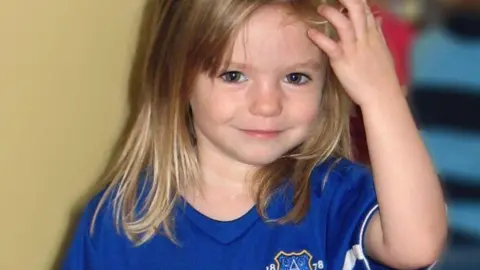 Handout
HandoutAlmost two decades since Madeleine's disappearance, it has become one of the highest-profile unsolved missing person cases in the world.
Earlier this year, German prosecutors pointed to evidence suggesting Brückner may have been in the area when Madeleine disappeared.
Elsewhere in June, Portuguese and German police conducted a fresh search of land in Lagos - between where the McCanns had been staying and addresses linked to Brückner, but this yielded no breakthroughs.

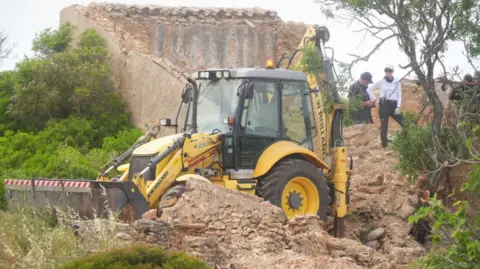 PA Media
PA MediaBrückner was not identified as a suspect in her disappearance until 2020.
Due to differences in legal systems, German authorities suspect Brückner of murder in relation to Madeleine, while British police continue to treat her disappearance as a missing persons case.
However, no charges have ever been brought against Brückner in the case of Madeleine, and the full details of the alleged evidence have never been released.
In 2023, investigators carried out searches near the Barragem do Arade reservoir, about 30 miles from Praia da Luz.
Brückner spent time in the Praia da Luz area between 2000 and 2017 and had photographs and videos of himself near the reservoir.
In October last year, Brückner was cleared by a German court of unrelated sexual offences, alleged to have taken place in Portugal between 2000 and 2017.
The funding given to the Met's investigation into Madeleine's disappearance, titled Operation Grange, has totalled more than £13.2m since 2011. A further £108,000 was secured from the government in April.
Warning: Contains disturbing content and graphic descriptions of sexual acts
A man running a sex ring operating out of Dubai's most glamorous neighbourhoods, and exploiting vulnerable women, has been identified by a BBC investigation.
Charles Mwesigwa, who says he is a former London bus driver, told our undercover reporter he could provide women for a sex party at a starting price of $1,000 (£740), adding that many can do "pretty much everything" clients want them to.
Rumours of wild sex parties in the UAE emirate have circulated for years. The hashtag #Dubaiportapotty, which has been viewed more than 450 million times on TikTok, links to parodies and speculative exposés of women accused of being money-hungry influencers secretly funding their lifestyles by fulfilling the most excessive of sexual requests.
Our BBC World Service investigation was told the reality is even darker.
Young Ugandan women told us they had not expected to have to undertake sex work for Mr Mwesigwa. In some cases, they believed they were travelling to the UAE to work in places like supermarkets or hotels.
At least one of Mr Mwesigwa's clients regularly asks to defecate on the women, according to "Mia", whose name we have changed to protect her identity, and who says she was trapped by Mr Mwesigwa's network.
Mr Mwesigwa denies the allegations. He says he helps women find accommodation through landlords, and that women follow him to parties because of his wealthy Dubai contacts.
We have also discovered that two women linked to Mr Mwesigwa have died, having fallen from high-rise apartments. Although their deaths were ruled as suicides, their friends and family feel the police should have investigated further.
Mr Mwesigwa said the incidents were investigated by the Dubai police and asked us to contact them for information. They did not reply to our request.
One of the women who lost her life, Monic Karungi, arrived in Dubai from western Uganda.
She found herself sharing a flat with dozens of other women working for Mr Mwesigwa, according to one of the women, who we are calling Keira, who says she lived with Monic there in 2022.
"[His] place was like a market… There were like 50 girls. She was not happy because what she expected is not what she got," Keira told us.
Monic thought the job in Dubai was going to be in a supermarket, according to her sister Rita.
"He [Mr Mwesigwa] was violent when I told him I wanted to go back home," says Mia, who also knew Monic in Dubai. She says that, when she first arrived, he told her she already owed him £2,000 ($2,711) and that within two weeks that debt had doubled.
"Money for air tickets, for your visa, for where you're sleeping, food," says Mia.
"That means you have to work hard, hard, hard, pleading for men to come and sleep [with] you."
Monic owed Mr Mwesigwa more than $27,000 (£19,918) after several weeks, according to what a relative of hers we are calling Michael says she told him. He adds that he received tearful voice notes from her.

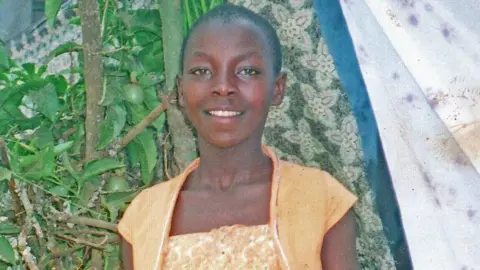 Family handout
Family handoutMia told us that clients were mostly white Europeans, and included men with extreme fetishes.
"There's this one client, he poops on girls. He poops and he tells them to eat the shit," she explained quietly.
Another woman we are calling Lexi, who says she was tricked by a different network, echoed Mia's story, saying "porta potty" requests were frequent.
"There was a client who said: 'We pay you 15,000 Arab Emirates Dirham ($4,084, £3,013) to gang-rape you, pee in your face, beat you, and add in 5,000 ($1,361, £1,004)'" for being recorded eating faeces.
Her experiences have led her to believe there is a racial element to this extreme fetish.
"Every time I said that I wouldn't want to do that, it seemed to get them more interested. They want somebody who is going to cry and scream and run. And that somebody [in their eyes] should be a black person."
Lexi says she tried to get help from the only people she thought could intervene - the police. But she says they told her: "You Africans cause problems for each other. We don't want to get involved. And they would hang up."
We put this allegation to the Dubai police and they did not reply.
Lexi eventually escaped back to Uganda and now helps to rescue and support women in similar situations.


Finding Charles Mwesigwa wasn't easy. We could only find one picture of him online - and it was taken from behind. He also uses multiple names across social media.
But through a combination of open-source intelligence, undercover research, and information from a former member of his network, we traced him to a middle class neighbourhood in Dubai - Jumeirah Village Circle.
To corroborate what sources had told us about his business - supplying women for degrading sex acts - we sent in an undercover reporter posing as an event organiser sourcing women for high-end parties.
Mr Mwesigwa appeared calm and confident when speaking about his business.

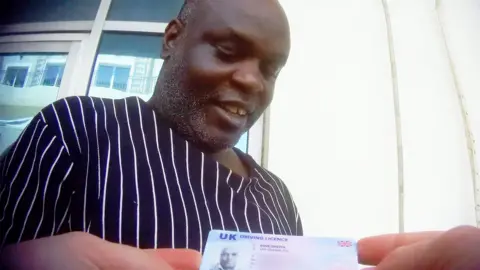
"We've got like 25 girls," he said. "Many are open-minded… they can do pretty much everything."
He explained the cost - from $1,000 (£738) per girl per night, but more for "crazy stuff". He invited our reporter for a "sample night".
When asked about "Dubai porta potty" he replied: "I've told you, they are open-minded. When I say open-minded… I will send you the craziest I have."
In the course of the conversation, Mr Mwesigwa said he used to be a London bus driver. We have seen evidence he put that occupation down on an official document in east London in 2006.
He went on to tell our reporter that he loved this business.
"I could win the lottery, a million pounds, but I would still do it… it's become part of me."
Troy, a man who says he used to act as operations manager for Mr Mwesigwa's network, gave us more information about how he says it is run.


He says Mr Mwesigwa pays off security at various nightclubs so they will let his women in to find clients.
"I've heard about types of sex that I've never seen in my life. It doesn't matter what you go through as long as his rich men are happy… [the women] have no escape route…They see musicians, they see footballers, they see presidents."
Mr Mwesigwa has been able to get away with running this operation, Troy claims, because Troy and others are not just used as drivers. He says their names are also used by Mr Mwesigwa to hire cars and apartments, so that his own name never appears on the paperwork.
On 27 April 2022, Monic posted a selfie from Al Barsha - a residential neighbourhood popular with expats in Dubai. Four days later, she was dead. She had been in the emirate for just four months.
According to Mia, Monic and Mr Mwesigwa had been regularly arguing in the period before she left. Mia says Monic had been refusing to comply with Mr Mwesigwa's demands and had found a way out of his network.
"She had got some kind of job. She was very excited. She thought she was gonna get free, she was going to get her life back because now that was a real job, no sleeping with men," Mia says.
Monic moved out to a different apartment about 10 minutes' walk away. It was from this apartment's balcony that she fell on 1 May 2022.

 Instagram
InstagramMonic's relative Michael, who was in the UAE at the time she died, says he tried to get answers.
Police told him they stopped their investigation, having found drugs and alcohol in the apartment Monic had fallen from, and only her fingerprints on the balcony, he says.
He obtained a death certificate for Monic from a hospital, but it did not say how she had died. And her family were unable to obtain a toxicology report for her.
But a Ghanaian man living in the apartment building was more helpful, he says, taking him to another block to meet the man he said was Monic's boss.
Michael describes the scene when he got there and saw where the women were housed.
He says through the cloud of shisha smoke in the living room, he made out what looked like cocaine on the table and women having sex on chairs with clients.
He claims he found the man we had previously identified as Charles Mwesigwa in bed with two women, and that when he tried to drag him to the police Mr Mwesigwa replied: "I have spent 25 years in Dubai. Dubai is mine… There is no way you are going to report me… Embassy is me, I'm the embassy.
"[Monic's] not the first to die. And she won't be the last," he added, according to Michael.
Mia and Keira both independently say they witnessed this conversation and both confirm its wording. When we asked Mr Mwesigwa what he meant by this, he denied having said it.
Monic's death shares haunting similarities with that of Kayla Birungi, another Ugandan woman who lived in the same neighbourhood as her, and died in 2021 after falling from a Dubai high-rise apartment which we have evidence to suggest was managed by Charles Mwesigwa.
The phone number for her landlord, shared with us by Kayla's family, turned out to be one of Mr Mwesigwa's numbers. Troy also confirms that Mr Mwesigwa managed the apartment, as do four other women we spoke to for this investigation.

 Instagram
InstagramKayla's relatives say that they - like Monic's family - heard Kayla's death had been linked to alcohol and drugs. But a toxicology report seen by the BBC shows none were present in her system at the time of her death.
While Kayla's family was able to repatriate her body and hold a burial, Monic's remains were never returned.
Our investigation found she was likely buried in a section of Dubai's Al Qusais Cemetery known as "The Unknown". It features rows and rows of unmarked graves, typically thought to belong to migrants whose family couldn't repatriate their bodies.
Monic and Kayla were part of a wider, unofficial pipeline connecting Uganda to the Gulf.
As Uganda wrestles with rising youth unemployment, moving to work abroad - mainly in the Gulf states - has become a huge industry that contributes $1.2bn (£885m) of tax revenue to the country each year.
But these opportunities can carry a risk.
Mariam Mwiza, a Ugandan activist against exploitation, says she has helped rescue more than 700 people from around the Gulf.
"We get cases of people who have been promised to work, let's say, in a supermarket. Then [that person] ends up sold as a prostitute," she told us.

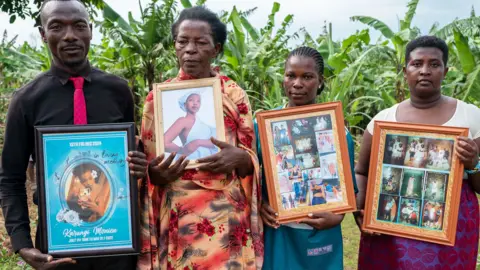
For Monic's family, grief is now tangled with fear. Fear for other families who could suffer the same loss they have, if nothing is done.
"We are all looking at Monica's death," her relative Michael told us. "But who is there for the girls still alive? They're still there. Still suffering."
The BBC asked Charles "Abbey" Mwesigwa to respond to all the allegations made in our investigation. He denied running an illegal prostitution ring.
He said: "These are all false allegations.
"I told you I am just a party person who invites big spenders on my tables, hence making many girls flock [to] my table. That makes me know many girls and that's it."
He also said: "[Monic] died with her passport meaning no-one was demanding her money for taking her. Prior to her death, I hadn't seen her for over four to five weeks.
"I knew [Monic and Kayla] and [they] were renting with different landlords. If no-one in both flats was arrested or any of the landlords, then there was a reason. Both incidents were investigated by the Dubai police and maybe they can help you."
The BBC contacted Al Barsha Police Station to request to see the case files for Monic Karungi and Kayla Birungi. It did not respond to that request or to allegations Monica and Kayla's deaths had not been properly investigated.
The BBC was unable to see any toxicology reports in relation to Monic Karungi, or speak to the landlord of the apartment in which she was living when she died.

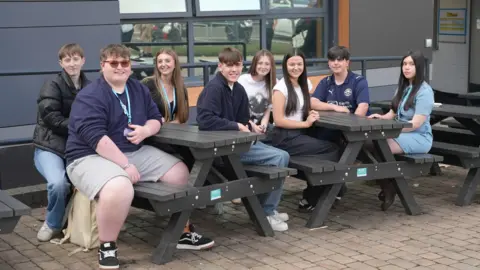 BBC
BBCWhen lockdown started, college student Sam was living with his mum because his parents were separated.
Then his dad died unexpectedly, leaving him feeling that "something had been stolen" from him.
His experience is one of many being highlighted as the Covid-19 public inquiry prepares to look at the pandemic's impact on children and young people.
A new report - seen exclusively by the BBC - includes individual accounts of 600 people who were under 18 during the pandemic.
They include happy memories of time spent with family, as well as the impact of disruption to schools being moved online, social isolation and the loss of relatives.
The inquiry will start hearing evidence on these issues from Monday 29 September.

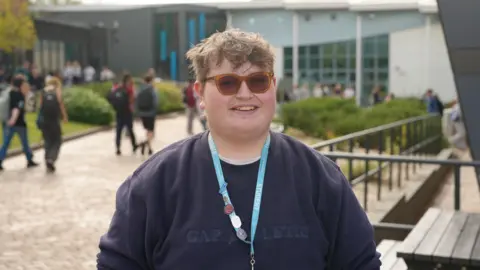
Wigan resident Sam was 12 during the first lockdowns and says he found it hard to understand the rules that prevented him spending more time with his dad.
His dad's death left him struggling with regrets that he had "lost a relationship" because of the isolation before his father's death.
"I do feel deep down that something has been stolen from me," he says.
"But I do know that the procedures that we had to go through were right. It was a bad situation."
Now 17, Sam's resilience has sadly been tested further after the loss of his mum, who recently died from cancer.
But Sam says that strength he built up during Covid has helped give him "the tools to deal with grief alone".
Kate Eisenstein, who is part of the team leading the inquiry, says the pandemic was a "life-changing set of circumstances" for the children and teenagers who lived through it.
The impact of the pandemic set out in the testimony is hugely varied and includes happier memories from those who flourished in secure homes, enjoying online learning.
Other accounts capture the fears of children in fragile families with no escape from mental health issues or domestic violence.
Some describe the devastating sudden loss of parents or grandparents, followed by online or physically distanced funerals.
Grief for family members lost during the pandemic is an experience shared with some of Sam's college classmates.
Student Ella told the BBC that losing her granddad during Covid had made her value spending more time with her grandma.
It is one of the ways in which Ella says she is trying to "catch up on the lost moments" she missed during Covid.
One almost universal experience for children living through the pandemic was much of life shifting to online platforms.
While this allowed family connections and friendships to be maintained, Ms Eisenstein said some children had darker experiences, spending up to 19 hours a day online, leaving them "really anxious".
"Some told us how they started comparing their body image to people online, how video games and social media distracted from their learning," she said.
Most worrying, she said, were the accounts revealing an increased risk of adults seeking to exploit young children online, including sending nude images and inappropriate messages.
The remarkable variety of experiences, both positive and stressful, adds up to what she describes as "an unprecedented insight into children's inner world".
Aaliyah, a student at Winstanley College near Wigan, says the social isolation she experienced aged 11 led to her spending hours looking at social media, which began altering her self-confidence.
"With the content I was seeing online, I'd start to look in the mirror and go, 'I could change that about myself,' or 'I don't really like that about myself,'" she says.

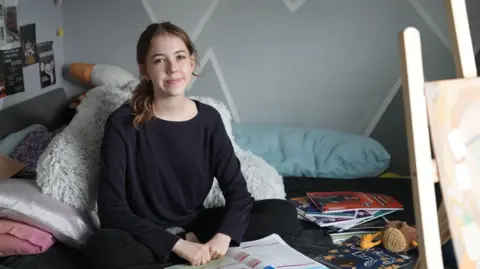
The inquiry is also expected to hear about the experiences of children still living with long Covid, like Avalyn, now 16, who became ill with the virus in October 2021.
While schools were beginning to return to normal, Avalyn was struggling with a deep and debilitating fatigue, and eventually left school for home education.
It took a year to get a formal diagnosis of long Covid and specialist advice.
"I enjoyed being in school, I enjoyed being social and seeing people, and then suddenly that was taken away from me very quickly," Avalyn says.
Before long Covid, Avalyn says she was sporty at primary school and enjoyed acrobatics.
Like lots of other children her age, Avalyn has shown determination and resilience to achieve the things that might not have been so difficult in other circumstances, and she has now passed four GCSEs.
"I knew I wanted to do GCSEs to prove to myself especially that I still had the ability to do what everyone else was doing," she says.
She still goes to a performing arts group, which allows her to join in as much or as little as she can manage.
Avalyn admits "it's weird to say", but in some ways she is "grateful" to have had long Covid, because of the things she has achieved during her long spells at home.
She has written, illustrated and self-published two children's books and spent more time on her art.
While the path ahead is not straightforward, she says she is optimistic of finding a way to study and get into work.
The inquiry plans to hear evidence on the impact of children and young people across four weeks from 29 September to 23 October.

 Getty Images
Getty ImagesThe UK and US are set to sign a landmark agreement aimed at accelerating the development of nuclear power.
The move is expected to generate thousands of jobs and strengthen Britain's energy security.
It is expected to be signed off during US President Donald Trump's state visit this week, with both sides hoping it will unlock billions in private investment.
Prime Minister Sir Keir Starmer said the two nations were "building a golden age of nuclear" that would put them at the "forefront of global innovation".
The government has said that generating more power from nuclear can cut household energy bills, create jobs, boost energy security, and tackle climate change.
The new agreement, known as the Atlantic Partnership for Advanced Nuclear Energy, aims to make it quicker for companies to build new nuclear power stations in both the UK and the US.
It will streamline regulatory approvals, cutting the average licensing period for nuclear projects from up to four years to just two.
The deal is also aimed at increasing commercial partnerships between British and American companies, with a number of deals set to be announced.
Key among the plans is a proposal from US nuclear group X-Energy and UK energy company Centrica to build up to 12 advanced modular nuclear reactors in Hartlepool, with the potential to power 1.5 million homes and create up to 2,500 jobs.
The broader programme could be worth up to £40bn, with £12bn focused in the north east of England.
Other plans include multinational firms such as Last Energy and DP World working together on a micro modular reactor at London Gateway port. This is backed by £80m in private investment.
Elsewhere, Holtec, EDF and Tritax are also planning to repurpose the former Cottam coal-fired plant in Nottinghamshire into a nuclear-powered data centre hub.
This project is estimated to be worth £11bn and could create thousands of high-skilled construction jobs, as well as permanent jobs in long-term operations.
Beyond power generation, the new partnership includes collaboration on fusion energy research, and an end to UK and US reliance on Russian nuclear material by 2028.
Commenting on the agreement, Energy Secretary Ed Miliband said: "Nuclear will power our homes with clean, homegrown energy and the private sector is building it in Britain, delivering growth and well-paid, skilled jobs for working people."
And US Energy Secretary Chris Wright described the move as a "nuclear renaissance", saying it would enhance energy security and meet growing global power demands, particularly from AI and data infrastructure.
Sir Keir has previously said he wants the UK to return to being "one of the world leaders on nuclear".
In the 1990s, nuclear power generated about 25% of the UK's electricity but that figure has fallen to around 15%, with no new power stations built since then and many of the country's ageing reactors due to be decommissioned over the next decade.
In November 2024, the UK and 30 other countries signed a global pledge to triple their nuclear capacity by 2050.
And earlier this year, the government announced a deal with private investors to build the Sizewell C nuclear power station in Suffolk.
Its nuclear programme also includes the UK's first small modular reactors (SMRs), which will be built by UK firm Rolls Royce.

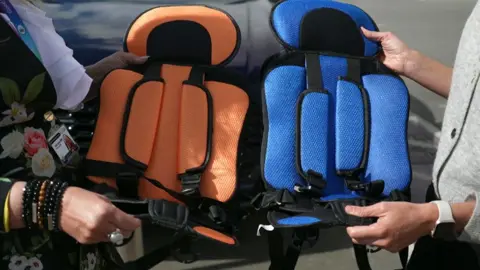 BBC
BBCLethal children's car seats are still appearing for sale on online marketplaces a decade after concerns were first raised by trading standards officers and a well-known consumer group.
Which? warned in 2014 the fabric seats were potentially dangerous to children due to safety defects and were illegal to use in the UK following tests by Surrey Trading Standards, which dubbed the products "killers".
Which? is urging parents not to be tempted into buying cheap seats after it found they are still being sold via online sites including Shein and eBay, both of which said they took safety very seriously.
Regulations state only EU-approved child car seats with R44 or R129 codes can be used in the UK.
Approved seats carry a clear orange label, on which the codes are printed, to indicate they have been put through EU safety testing and can therefore be legally sold on the UK market.
In 2014, Surrey Trading Standards tested a fabric seat which fell to pieces in a 30 mph accident. The crash test dummy of a three-year-old child was flung through the windscreen when the straps securing the seat failed.
Which? said families struggling with living costs could be tempted by the cheaper products, which cost as little as £12.50, compared to the more expensive ones that retail in excess of £80.
Stuart Howarth, a car seat safety advisor at Good Egg Safety, which campaigns on child safety, told BBC News he had seen a child using an unsafe seat that had "no support to the body" and "no way of securing it to the car safely".
"It's just a lethal piece of material," he said.
"You might as well just sit on a settee cushion and hope for the best."


Which? said it found more than a dozen listings of illegal car seats on websites such as eBay, Little Dreams, ManoMano, Shein and Wish.
One listing for a child's car seat on eBay warned against using it in cars despite the product being described as suitable.
The description in the listing read: "It is best not to use it on high-speed cars.
"We recommend that it be used in non-motorized products such as electric vehicles, two-wheelers... Because it is not a child safety seat that complies with traffic."
In response, eBay said consumer safety "is a top priority".
"We swiftly removed these listings and notified buyers, and we continue to strengthen our preventative measures," a spokesperson said.
Which? said stricter rules were needed to "impose a clear and robust duty on online marketplaces to prevent the sale of unsafe products" and called for "strong penalties and rigorous enforcement".
Sue Davies, Which? head of consumer protection policy, said: "It is appalling that these deadly car seats are reappearing on online marketplaces more than a decade after Which? first exposed them, but it is not surprising."
She said children's lives "will be at risk" until online retailers were forced to comply with product safety regulations.

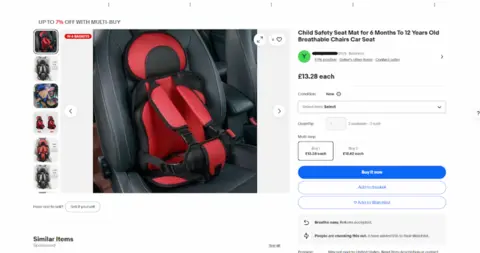 Which?
Which?Which? advised families to look for retailers who can provide guidance and help fit the seat.
It suggested car seats should not be bought secondhand, as they might have been involved in an accident and damage to the seat may be unclear.
Janis James, chief executive of Good Egg Safety, urged parents not to "skimp" on cash when purchasing car seats for children.
In a statement, Shein said it was committed to "offering safe and reliable products to its customers".
The online retail giant said the product Which? found listed on its website had been "mislabelled" by a third-party seller and Shein had "taken action against the seller" after removing it from its platform.
It said vendors were required to comply with the company's rules and "stringent safety standards and must also abide by the relevant laws and regulations of the markets where we operate".
Little Dreams also told the BBC product safety was a "top priority".
ManoMano said its online marketplace was used by third party sellers to sell their own products.
It added: "We rely on our sellers to provide a resolution to any product/fulfilment issues."

 BBC
BBCWhen life gets busy and stress levels rise, it's not uncommon to find yourself walking into a room and forgetting why you went there, losing your train of thought mid-sentence or struggling to stay focused on simple tasks.
Especially after the weekend, it can be hard to get back into work or study mode.
This mental cloudiness is often called brain fog and while it isn't a medical condition in itself, it refers to a collection of cognitive symptoms such as difficulty concentrating, forgetfulness, and mental slowness.
Common causes of it can include menopause or perimenopause, but it can also strike when you've got too much on your mind.
Medical doctor and Morning Live expert, Dr. Tharaka has these four tips and a special acronym to help cut through the haze.
Brain fog can happen to anyone and it's not a personal failing or a sign that you're not coping.
Often, it's simply your brain's way of saying it's tired, stressed or overstretched.
Remind yourself that brain fog is usually temporary and it's okay to slow down, delegate tasks or ask for help when you need it.
If you are concerned then you should contact your GP.
Reduce decision fatigue by having a set rhythm to your days - a predictable structure can take pressure off your working memory.
Knowing what's coming next stops your brain from constantly asking, "What am I doing today?"
It's worth creating a morning and evening routine and even something as simple as laying out clothes or prepping breakfast ahead of time frees your mind from constant decision-making.

 Getty Images
Getty ImagesIt's easy to fill your diary with back-to-back commitments - meetings, social events, errands and daily tasks - without leaving any breathing room.
But constantly jumping from one thing to the next can leave your brain no time to reset, making brain fog more likely.
Try deliberately scheduling short breaks between activities, even just 5–10 minutes to stretch, get a drink, step outside or sit quietly.
Think of these firebreaks like mental buffers: they give your mind a chance to process what you've just done, let go of lingering stress and prepare for what's next.
Trying to hold every appointment, task and reminder in your head can quickly lead to mental clutter and forgetfulness.
Let tech do the remembering for you - use calendars and reminders to free up mental space.
Schedule recurring tasks so they happen automatically - for example, block out lunch in your diary each day or set weekly reminders for bills and chores.
This means you're not constantly thinking, "What do I need to remember next?"

 Getty Images
Getty ImagesAlongside these practical daily strategies, Dr T also recommends using his Swans acronym to support brain health and sharpen focus.
Each letter stands for a key habit that can help clear the mental mist and keep your mind performing at its best:
Use the NHS website to find out more about brain fog and how to manage it.

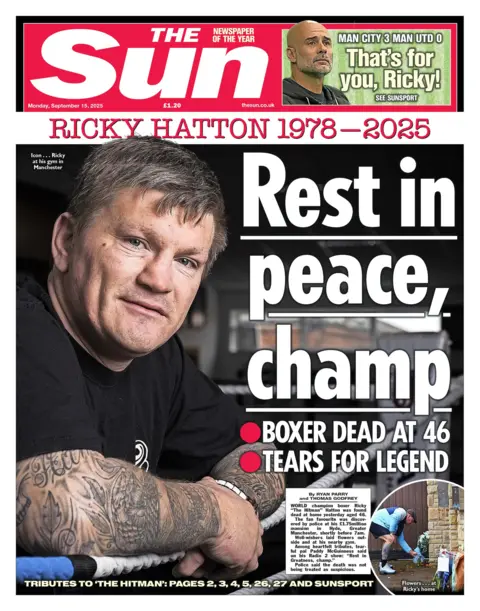

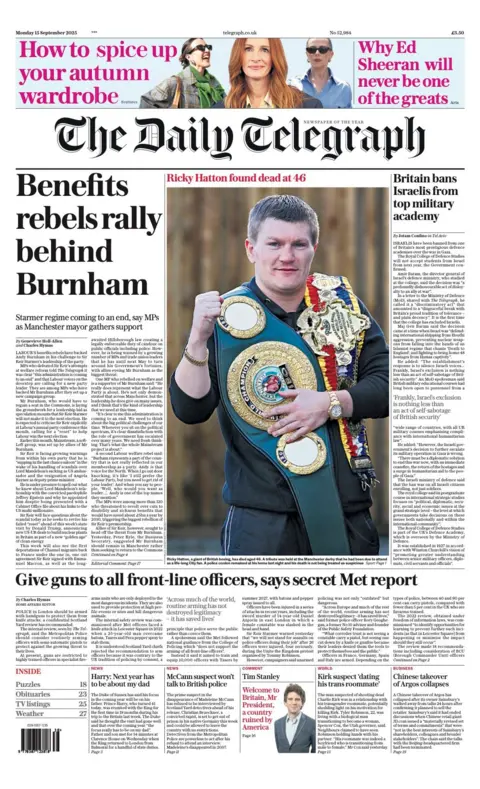

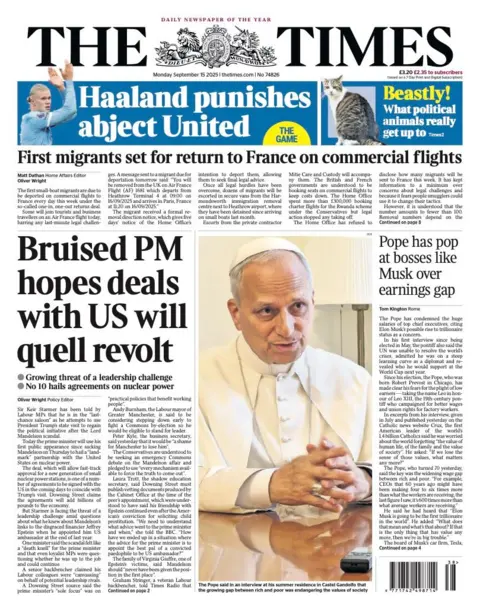

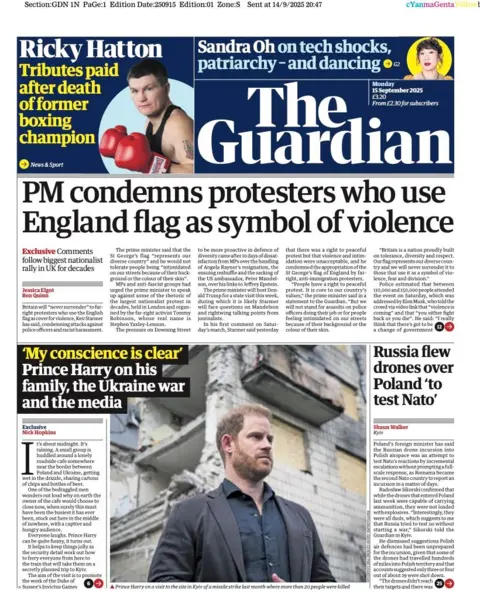



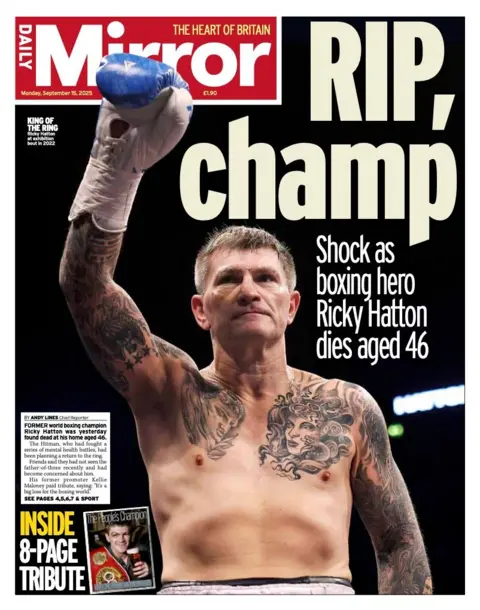



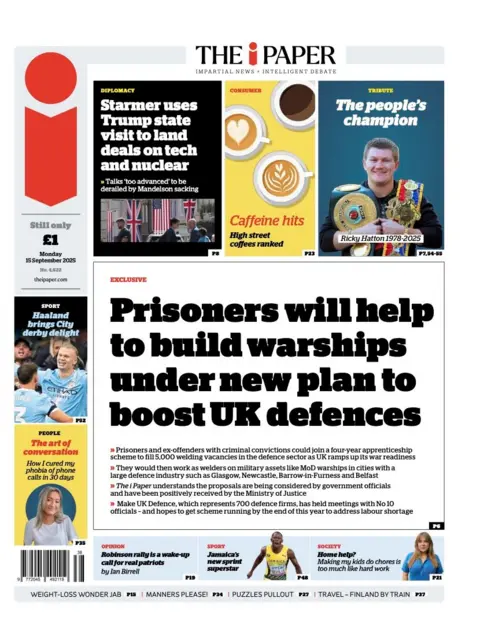

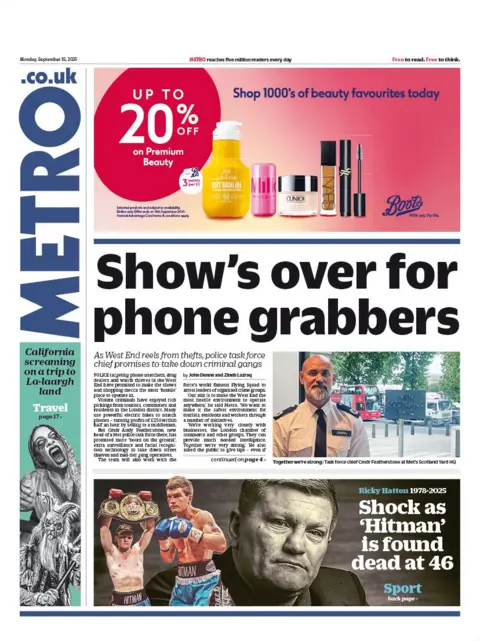



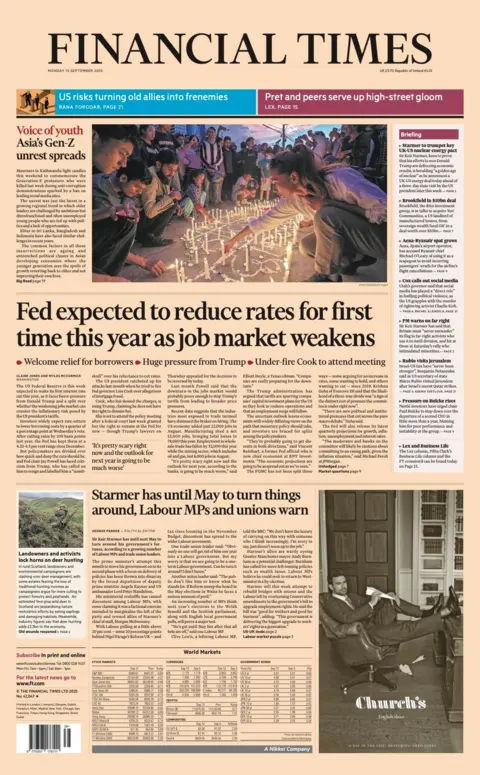


Sign up for our morning newsletter and get BBC News in your inbox.



 BBC
BBCOn a scorchingly hot day in the American Midwest, Tim Maxwell is voicing his fears about the future of farming.
The 65-year-old has worked the fields since he was a teenager. He now owns a grain and hog farm near Moscow, Iowa - but he's unsure about its prospects.
"I'm in a little bit of a worried place," says Mr Maxwell, who wears a baseball cap bearing the logo of a corn company.
He is concerned that American farmers aren't able to sell their crops to international markets in the way they could in previous years, in part because of the fallout from President Trump's tariffs.
"Our yields, crops and weather are pretty good - but our [interest from] markets right now is on a low," he says. "It's going to put stress on some farmers."

 Bloomberg via Getty Images
Bloomberg via Getty ImagesHis fears are not unique. US agricultural groups warn that American farmers are facing widespread difficulty this year, mostly due to economic tensions with China. Since April, the two countries have been locked in a trade war, causing a sharp fall in the number of Chinese orders for American crops.
American farmers are wounded as a result, economists say. The number of small business bankruptcies filed by farmers has reached a five-year high, according to data compiled by Bloomberg in July.
With all this economic pain, rural areas could well have turned against Trump. But that doesn't seem to be happening.
Rural Americans were one of the president's most loyal voting blocs in last year's election, when he won the group by 40 percentage points over Kamala Harris, beating his own margins in 2020 and 2016, according to Pew Research analysis.
Polling experts say that in the countryside, he is still broadly popular.


Mr Maxwell says he is sticking with Trump, despite his own financial worries. "Our president told us it was going to take time to get all these tariffs in place," he says.
"I am going to be patient. I believe in our president."
So why do so many farmers and other rural Americans broadly continue to back Trump even while feeling an economic squeeze that is driven in part by tariffs - the president's signature policy?
If you want a window into rural America, the Iowa State Fair is a good start. The agricultural show attracts more than one million visitors over 10 days.
There is candy floss; deep-fried hot dogs on a stick for $7 (£5) - known as "corn dogs"; an antique tractor show; a competition for the biggest boar.
But when the BBC visited last month, there was another topic of conversation: tariffs.


"A lot of people say he's just using tariffs as a bargaining chip, as a bluff," says Gil Gullickson, who owns a farm in South Dakota and edits an agriculture magazine.
"But I can say: history proves that tariffs don't end well."
In April, what he termed "liberation day", Trump imposed sweeping tariffs on most of the world, including a 145% tariff on China.
In response, China put a retaliatory 125% tariff on American goods - a blow to farmers in the American Midwest, sometimes known as the "corn belt", many of whom sell crops to China.
Last year Chinese companies bought $12.7bn (£9.4bn) worth of soybeans from America, mostly to feed their livestock.
September is harvest season, and the American Soybean Association (ASA) has warned that soybean orders from China are way below where they should be at this point in the year.


Tariffs have fluctuated dramatically since they were introduced - and the uncertainty is proving tough for farmers, says Christopher Wolf, a professor of agricultural economics at Cornell University.
"China is just so big that when they buy things, it matters - and when they don't, it matters."
The cost of fertiliser has rocketed, too - partly because of trade disputes with Canada, which has raised the cost of potash, a salt imported from Canada by American farmers and used in fertiliser.
Jon Tester, a former Democrat Senator of Montana, who is a third-generation farmer, told a US news station earlier this month: "With all these tariffs the president's put on, it's interrupted our supply chain… it's increased the cost of new equipment… and because of the trade and tariffs, a lot of customers have said to heck with the United States…
"The people who are new to agriculture, those young farmers who haven't saved money for times like this, they're going to be in trouble and a lot of those folks are going to go broke.
"And if this continues, a lot of folks like me are going to go broke too."


American farmers already suffer from high levels of stress. They are more than three times more likely than average to die by suicide, according to a paper by a charity, the National Rural Health Association, which analysed a period before Trump's presidency.
In a letter to the White House, Caleb Ragland, president of the ASA, warned of a tipping point: "US soybean farmers are standing at a trade and financial precipice."
Supporters of President Trump say that his tariffs will help American farmers in the long run, by forcing countries like China to come to the negotiating table and agree new deals with the US over agriculture.
And they point to other ways this White House has helped farmers. Over the summer, as part of Trump's tax and spend bill, his administration expanded federal subsidies for farmers by $60bn (£44bn), and boosted funding for federal crop insurance.
In his annual speech to Congress in March, Trump warned farmers of a "little bit of an adjustment period" following the tariffs, adding: "Our farmers are going to have a field day… to our farmers, have a lot of fun, I love you."

 Getty Images
Getty ImagesSid Miller, commissioner of the Texas Department of Agriculture, is among those who have praised Trump for his "vital support".
"We finally have an administration that is prioritising farmers and ranchers," he wrote in a statement earlier this year. "They advocate for farmers, challenge China ... and ensure America's producers are receiving fair treatment."
And it is possible the president's tariff strategy could eventually work, according to Michael Langemeier, a professor of agricultural economics at Purdue University.
But he also worries that uncertainty is inflicting long-term damage. "Your trading partner doesn't know exactly what your position's going to be next year, because it seems like we're changing the goalposts.
"That is a problem."
There's an old adage in American politics that says people "vote with their pocketbooks" - and turn against politicians if they appear to harm their finances.
Yet despite financial pressures, the rural Americans we spoke to are firmly sticking with Trump.
Experts say they haven't seen any evidence of meaningful change in support among rural voters since last year. A survey by Pew last month found that 53% of rural Americans approve of the job Trump is doing, far higher than the 38% figure for the country as a whole.
Though a survey by ActiVote earlier this month did find a small decline in Trump's approval among rural voters from 59% in August to 54% in September. Analysts warn not to pay too much attention to those shifts, however, because the number of rural voters included in those polls is so small.
"The data I've seen suggests Trump is still heavily supported in rural communities," says Michael Shepherd, a political science professor at the University of Michigan who focuses on rural politics.


For some farmers at the state fair, the explanation is simple: they believe the US president when he tells them that tariffs will help them in the long run.
"We think the tariffs eventually will make us great again," says John Maxwell, a dairy farmer and cheese producer from Iowa.
"We were giving China a lot, and [previously] we paid tariffs when we sold to them. Let's make it fair. What's good for the goose is good for the other goose."
Some may also hold onto hope that the president will bail farmers out. During Trump's first term he gave farmers a $28bn (£20.7bn) grant amid a tariff dispute with China.
For Nicholas Jacobs, a politics professor at Colby College and author of The Rural Voter, there's a deeper reason at play.
"It's easy for an outsider to ask, 'Why the hell are you still with this guy?'" he says. "But you have to understand that across rural America, the move towards Republicans long predates Donald Trump."
Starting in the 1980s, he says, rural Americans started to feel alienated and left behind while cities benefited from globalisation and technological change.
What he calls a "rural identity" formed, based on a shared grievance and an opposition to urban liberals. The Republicans seemed like their natural champion, while he says the Democrats became "the party of the elite, technocrats, the well-educated, the urbane".

 Bloomberg via Getty Images
Bloomberg via Getty ImagesSome repeat that sentiment at the state fair. Joan Maxwell, a dairy farmer from Davenport in Iowa, says that her area is too often viewed as "flyover country".
"We are not looked at very positively for the most part from the media," she says. "We've been called deplorables, uneducated," - a reference to Hillary Clinton's description of half of Trump's supporters as a "basket of deplorables".
Ms Maxwell added: "A lot of times they ignore us or make fun of us."
Prof Shepherd, of Michigan University, believes there's another factor: in his view, America has become so polarised - with voters from both sides entrenched in their camps - that many are willing to forgive much more than they would previously, as long as it's a policy implemented by their own side.
He calls this "selective blame attribution… they might be really angry about some things that are happening, but they're reticent to blame Trump for them."
Mr Wolf has his own view on the "best case scenario" from here. "What I hope happens is that he [Trump] just declares victory and leaves it [tariffs] alone."
But he warns that even if the policy is dropped, the damage to American farmers could be long-term due to the shake-up to supply chains. Some Chinese firms are now buying their soybeans from Brazil rather than America, he says; they may not quickly return.
Many of the analysts we spoke to believe that rural America's support for Trump is not a blank cheque, despite their current support.

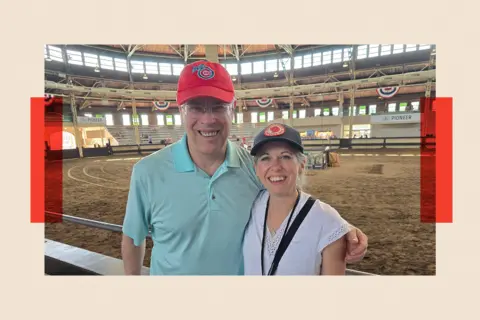
Mr Shepherd points to the Great Depression and rural "Dustbowl" of the 1930s, which forced millions of farmers to migrate to American cities, causing a long-term realignment in politics - though nobody expects it to get anywhere near that bad this time. The farm crisis of the 1980s also saw thousands of farms go under.
Back at the state fair, Ms Maxwell, the Iowan dairy farmer, makes this point clear.
"We're giving him the chance to follow through with the tariffs, but there had better be results. I think we need to be seeing something in 18 months or less.
"We understand risk - and it had better pay off."
Additional reporting: Florence Freeman
BBC InDepth is the new home on the website and app for the best analysis and expertise from our top journalists. Under a distinctive new brand, we’ll bring you fresh perspectives that challenge assumptions, and deep reporting on the biggest issues to help you make sense of a complex world. And we’ll be showcasing thought-provoking content from across BBC Sounds and iPlayer too. We’re starting small but thinking big, and we want to know what you think - you can send us your feedback by clicking on the button below.

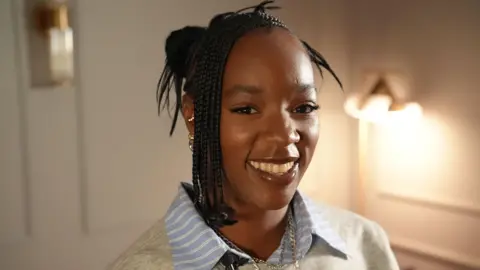 BBC
BBCThe Summer I Turned Pretty fans are preparing for this week's series three finale - and many are desperate to know how the season will end.
The Amazon show has been a breakout hit for young viewers and the tech giant is taking no chances of spoiling the story.
For actress Corinna Brown, who plays Gemma, the secrecy began before she even auditioned.
"There were codenames galore," she remembers. "There was a codename for the title of the show, there was a codename for my character.
"I thought up until maybe two days before we started shooting that my character was called Maeve.
"Amazon are very good at keeping it a secret."
So keen are producers to prevent spoilers, BBC News is speaking to Brown under the condition she doesn't discuss the finale, which drops on Prime Video on Wednesday.
Warning: The below may contain spoilers - especially if you haven't watched series three of the show
Millions are gripped by the show's love triangle plot between Isabel 'Belly' Conklin, played by Lola Tung, and brothers Conrad and Jeremiah Fisher, played by Christopher Briney and Gavin Casalegno.
Among the obsessions for fans have been a tiny engagement ring, a two-tier mirror glaze dark chocolate cake with raspberries and that sensual peach scene.
Brown's character Gemma is one of Belly's new friends she meets after her move to Paris. So what was it like to be part of a cultural phenomenon?
"It was so exciting because it's so highly anticipated and everybody wants to know what's going to happen," London-born Brown, 26, says.
"The fan base are so passionate, which is something you don't always get."
She says she "didn't really realise" how big the fandom of the show was until its release.
"So I think that was a good thing, to be fair, because otherwise, from the beginning, I would have been like: 'Oh my God'."
As the show's Paris-era was unlocked, viewers have been introduced to a new supporting cast in Belly's circle in the French capital, including Gemma, who like Belly, is new to Paris.
Brown describes her character as a "kindred spirit" to Belly.
They meet outside a nightclub, when Gemma is being bothered by a man. Belly steps in to help her out and the two become friends.
Brown says it is one of her favourite moments and shows "women supporting each other".

 Getty Images
Getty ImagesAccording to Amazon, this season's first episode drew in 25 million global viewers, a 40% increase on the previous season, with Prime Video saying it is its most-watched TV season among women aged 18-34.
Brown thinks the success of the show comes down to the writing by Jenny Han, who wrote the young adult (YA) romance books the TV series is based on.
"She knows what she's doing. She's got everybody hooked from the books," Brown says.
"It's lucky me to be a little part of that."
Brown feels another reason why the show resonates is "because we all go through it".
"We go through friendship, heartache, love, confusion. For the audience that watch this show and love The Summer I Turned Pretty that is a big thing, it's a new thing, it forms so much of your life.
"Being able to watch someone's else experience of that is helpful... and we all love a bit of romance," she says.
Beyond the traditional audience watching on screens, there are countless fan edits and reaction videos posted on social media, which Corinna says have been positive towards her character.
"They've been lovely. I've only seen good things. They say they like Gemma giving her [Belly] straight advice."

 Prime Video
Prime VideoAlready beloved by YA fans for her turn as Tara Jones in Netflix-hit Heartstopper, Brown is no stranger to the world of teen romance adaptations.
"With any show that's for a young audience, you have to have that awareness of the young minds that you're inspiring, shaping," Brown says.
"And that's an honour in itself."
Amid all the buzz of the show, secrets are tightly guarded and with the finale about to drop we are not allowed to ask Brown what happens in it.
But we can't help but ask what feels to fans like the summer's most pressing question: Are you team Conrad or team Jeremiah?
"I'm going to keep my lips tight on that one," Brown says, smiling.
"But what I will say is I am Team Gemma and Team Belly's friendship forever."


被戏称是“战略忽悠局局长”的中国知名军事专家张召忠,在从公众视野中消失多年后罕见露面,出席了北京官方主办的一场抗战主题讲座,一头白发登上微博热搜。
北京市平谷区科学技术协会微信公众号“平谷科普”上周三(9月10日)发文预告,张召忠上周四(11日)下午2时,在平谷区影剧院主讲题为“铭记抗战历史,认清世界战略格局”的讲座。讲座由中共平谷区委员会和平谷区政府指导,平谷区委教育工委和平谷区教委主办。
据介绍,这场讲座上,张召忠与师生们“回望浴血抗战的漫漫长路”,结合美国总统特朗普新政,探讨现如今世界经济、国际安全和军事态势的现状与变化。
文章称:“作为活跃于电视媒体、网络、新媒体的著名军事评论家,因其幽默的解说风格、亲民的军事科学传播路线、深厚扎实的理论功底、与时俱进的思维观念,张召忠教授获得了国民的一致好评,被亲切地称为‘局座’。”
张召忠在中国多个社交媒体平台拥有逾千万粉丝,不过在2020年突然全面停止更新,一度引起外界揣测。
上周的讲座开始前,官方曾提供这场讲座的网络直播链接,但在讲座当日被临时取消,不过张召忠当天仍如期开讲。观察者网旗下“风闻社区”星期五(12日)在微博引用网民照片显示,在公众视野中消失了五年的张召忠已是一头白发,“真的老了很多”,“局座白发”也登上微博热搜。
中国民族主义网红“盖世英雄玉椒龙”在微博发文称,张召忠这次出现,“好歹平息了网络谣言,公知前段时间还造谣他出事、造谣他去美国呢”。
网名“奥卡姆剃刀”的原中国陆军工程大学副教授张弛则发文说,张召忠不再出现在公众视野,跟现在的政策有关。“据我了解,我曾经的老领导,退休的军队大专家,都不允许做社会兼职,这已经是个普遍性的纪律要求了。就是授课演讲,也有着更加严格的报备要求。”
公开信息显示,今年73岁的张召忠,退休前任中国国防大学教研部副主任、教授,副军职,海军少将,军事战略学博士研究生导师,军事装备学学科带头人。1992年起参与中国中央电视台节目,负责对国际军事形势进行分析和评论。2015年退休后开办自媒体进行军事科普和国防教育。
中国官媒《环球人物》曾发文称,在互联网还没普及的年代,张召忠在一众规矩谨慎的专家中脱颖而出,后来更因直播伊拉克战争时的预测失误而名声大噪。批评者因此封他为“战略忽悠局局长”,意思是从战略上忽悠美国。但这个带有贬义的称呼,却在互联网时代被玩成了一个梗,后成为粉丝对张召忠的爱称。
韩国外交部星期一(9月15日)称,韩国外长赵显将于星期三(17日)至星期四(18日)访华。
据路透社报道,韩国外交部在一份声明中说,赵显将于星期三与中国外长王毅举行会晤,讨论包括中国国家主席习近平下个月访问韩国在内的多项计划。
中国官方通报,一支中国车队在尼日利亚被武装分子持枪袭击,有一名中国公民被绑架。
新京报星期天(9月14日)引述中国驻拉各斯总领事馆消息报道,一支载有五名中国公民的车队近日在尼日利亚遭不明身份武装人员袭击,其中一人被绑架。当局正全力解救被绑架中国公民。
中国驻拉各斯总领事馆工作人员称,事发现场发生枪击,被绑架者是中国公民,上述事件仍在处理中。目前,被强行绑走的中国公民仍在营救中,其余四名中国公民身体无大碍。
中国驻拉各斯总领事馆上星期六(13日)在微信公众号“拉各斯之声”发文,提醒在尼日利亚中国公民加强安全防范。
中领馆称,尼日利亚社会近期治安仍然不靖,盗窃、抢劫、绑架等案件时有发生,总体安全风险较高,因此提醒在尼中资企业和中国公民务必高度重视自身安全,采取措施防范各类风险。
中领馆呼吁,在尼中国人员和企业要杜绝夜间作业,确保员工与财产安全,赴高风险地区人员应提前做好风险评估,并加强安全防范;尽量减少外出活动,如确需外出,务必强化出行安保措施,不要提前透露行踪,选择多条路线交替使用,避免被不法分子摸清出行规律,也杜绝单独出行,切勿前往偏僻、治安状态较差的地区,加强自我保护。
路透社上周引述尼日利亚一家保安机构报道,尼日利亚南部发生一起枪击案,八名保安人员被枪杀,中国籍工人被绑架。这些工人事后获救。这起事件发生在9月5日,一群疑似武装人员袭击非军事组织尼日利亚保安和民防部队和受聘于当地企业BUA Cement的中国籍人员。

© Valerie Macon/Agence France-Presse — Getty Images
澳门星期天(9月14日)举行立法会选举,初步点票结果在星期一(15日)凌晨揭晓。特首岑浩辉说,在各方的共同努力下,此次选举顺利举行。
据澳门特区政府新闻局官网星期一凌晨1时30分发布的消息,岑浩辉表示,经过选举管理委员会、有关公共部门以及全体选务工作人员的精心组织和筹备,整个选举投票过程井然有序,各投票站运作畅顺,整体秩序良好。投票地点周边,选举服务站人员为选民提供交通疏导及周到服务。
岑浩辉说,广大选民积极行使公民权利,参与选举踊跃投票,投票人数达到17万5272人,投票率为53.35%。他进一步说,在各方的共同努力下,此次选举能够在依法、公平、公正、廉洁的环境下顺利举行。
岑浩辉也提到,这是澳门去年修订《立法会选举法》后的首次立法会选举,意义十分重大。
澳门立法会由33名议员组成,其中14席直接选举产生、12席间接选举产生,其余七席由特首委任。
据香港商业电台网消息,澳门立法会选举的初步点票结果在星期一凌晨揭晓,14席直接选举产生的议员包括高天赐、宋碧琪、李静仪、梁鸿细、陈孝永、柳智毅等人。其中,高天赐以超过4万3000张票成为“票王”。
英国连锁超市集团森宝利(Sainsbury’s)星期天称,已终止与中国电商巨头京东就出售旗下综合零售商Argos的谈判。此前一天,森宝利证实双方正在谈判。
据路透社报道,森宝利在一份声明中说:“京东已表明,目前只愿意就经过重大修改的条款和承诺进行接触,但这不符合森宝利股东、员工及更广泛利益相关者的最佳利益。”
森宝利重申,对2025至2026财年的零售基础营业利润预测约为10亿英镑(17.39亿新元)。京东拒绝置评。
森宝利上星期六(9月13日)证实,正在与京东就出售Argos进行谈判。
Argos是英国第二大百货零售商,网站浏览量位居英国零售网站第三名,拥有超过1100个取货地点。

© Ian Austen/The New York Times

© Victor J. Blue for The New York Times

© Pool photo by Jordan Pettitt

© Al Drago/Bloomberg

© Johnny Franklin/andmorebears, via Getty Images